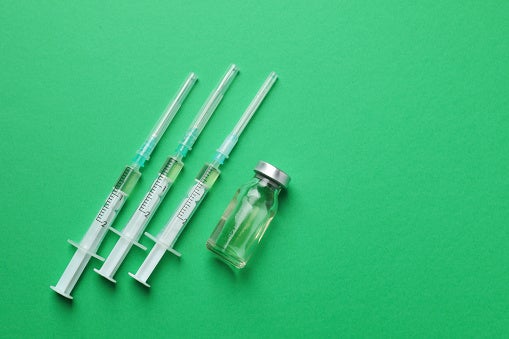How Often Do You Have To Get A Tetanus Shot
How Often Do You Need a Tetanus Shot?
October 26, 2021
Key takeaways:
-
Tetanus, also known as "lockjaw," is an infection that causes painful muscle contractions.
-
Tetanus boosters are recommended every 10 years except in special circumstances.
-
Most insurance plans cover part or all of the cost of a tetanus vaccine.

Advertisement
Advertisement
Every fall, there's an effort to make sure everyone is caught up on their vaccinations. These campaigns usually center on influenza and pneumonia vaccinations because those infections are more common in the colder months. But healthcare providers and pharmacists may also use this opportunity to talk about less frequently needed vaccines.
The next time you pick up your prescriptions, someone may ask you when you last had a particular vaccine. The honest answer may be, "I don't know," and that's OK. We often forget the last time we had a vaccine — especially if it's only recommended once in a while.
One of these less frequent vaccines is a tetanus shot. This vaccine can be a little confusing because of the different recommendations and types of tetanus shots. Let's discuss what tetanus is and when you should get a tetanus shot.
What is tetanus?
Tetanus is an infection caused by the bacteria Clostridium tetani. This bacteria releases a toxic substance that causes painful muscle contractions, especially in the face and jaw. Because these are the most common symptoms, tetanus is also called "lockjaw."
Face and jaw muscle stiffening are usually the first signs of a tetanus infection. These muscle spasms tend to move downward in the body as the illness continues. Spasms can spread to the neck, abdomen (stomach), and legs.
Without treatment, tetanus can lead to serious symptoms, including:
-
Seizures
-
Blood pressure changes
-
Broken bones
-
Swallowing problems
-
Life-threatening breathing problems
Treatment includes tetanus immunoglobulins to remove the poison causing spasms. Immunoglobulins are immune system proteins that help fight infections. The immunoglobulins needed to treat tetanus have to be donated by a person who's immune to tetanus. Antibiotics may also be given to kill the bacteria.
Healthcare providers may use muscle relaxers or benzodiazepines to lessen spasms. In serious cases, people are placed on ventilators to help them breathe.
How do you prevent tetanus?
An important aspect of tetanus prevention is wound care. The bacteria that causes tetanus is found in the environment. It lives on soil, manure, and metal objects.
Cleaning wounds we get outside plays a huge role in tetanus infections. Washing hands, cleaning cuts, and seeking medical attention for serious injuries goes a long way in preventing tetanus. Timing is also important — try to get medical attention as soon as you can after potential exposure.
However, the best way to prevent tetanus is by getting vaccinated. Tetanus vaccines are safe and effective. But in order for them to work best, you need to stay up to date with booster shots. There are a few different tetanus shots available. Let's discuss the two used for adults: Tdap and Td.
What is a Tdap shot?
The Tdap shot is a common tetanus vaccine. But this vaccine protects against more germs than just tetanus.
"Tdap" stands for tetanus, diphtheria, and acellular pertussis. Diphtheria is a bacterial infection that can cause trouble breathing, heart damage, and paralysis. Pertussis, or whooping cough, can cause pneumonia, seizures, and brain damage, especially in infants and children. The word "acellular" means that only part of the pertussis bacteria is used to make the vaccine.
The diphtheria and pertussis vaccines are commonly combined with tetanus because of similar recommended vaccine schedules. This helps lower the number of shots given at one time.
Tdap vaccines can be given to anyone over the age of 10. The first dose is recommended between ages 11 and 12. After that, you get regular boosters every 10 years, with a few exceptions that we'll discuss below. A tip to remember when to get your next tetanus vaccine is on your decade birthdays (i.e., when you turn 20, 30, and so on).
Adacel and Boostrix are the two FDA-approved Tdap vaccines.
Advertisement
Advertisement
What is a Td shot?
Td vaccines are similar to Tdap shots. However, they only protect against tetanus and diphtheria — not pertussis. Td shots are recommended for people over 7 years old as booster shots. They're not recommended if you haven't been vaccinated before. Td vaccines were the original tetanus boosters until Tdap shots became available in 2005.
The Td shot versions available are Tenivac and its generic, TDVAX.
How often should you get a tetanus booster shot?
Tetanus booster shots are recommended every 10 years to prevent infections. As long as you've received one dose of Tdap, boosters can be either a Tdap or Td shot.
There's a catch-up schedule for adults who never received childhood tetanus shots. It's recommended the first catch-up dose be a Tdap shot. The rest of the series can be Tdap or Td shots.
Are there any special situations I should be aware of?
Tetanus shots are for more than routine prevention. They can also help prevent infection when you get cut.
If your wound is minor and clean (meaning no dirt or feces in it), you'd only need a booster if it's been more than 10 years since your last one. Either a Tdap or Td shot can be used.
For some injuries, such as puncture wounds or animal attacks, you may need a tetanus shot sooner. In these situations, a Tdap or Td vaccine is recommended if it's been more than 5 years since your last booster.
Should I get a tetanus booster during pregnancy?
Yes. Pregnant women should get a Tdap shot between weeks 27 and 36 of pregnancy. This is recommended for every pregnancy, regardless of when your last booster was.
People that will have close contact with a newborn may also need to get a Tdap shot at least 2 weeks before the baby is born. This might include a partner, grandparents, and other family members. But these people would only need a Tdap shot if it's been more than 10 years since their last one.
It's important to note that these recommendations aren't to protect against tetanus. They're to protect newborns against pertussis (whooping cough). As mentioned earlier, pertussis can be very dangerous to infants. Tdap shots are the only FDA-approved vaccines that protect against pertussis for people over 10.
What do I tell my healthcare provider if I get cut or bitten and I don't know my tetanus vaccine status?
If you don't know when you were last vaccinated, a Tdap or Td booster is recommended if you've been cut or bit by an animal. If you don't know if you've ever been vaccinated, Tdap is preferred.
It's important to be honest with your healthcare provider. If you're not, it could delay your shot and raise your risk of infection.
Side effects of the tetanus shot
The side effects for Tdap and Td shots are similar. The most common side effects include:
-
Pain, swelling, or redness where you were vaccinated
-
Mild fever
-
Headache
-
Tiredness
In addition to these, the Tdap shot may cause:
-
Chills
-
Body or joint pain
-
Nausea or vomiting
-
Swollen glands
Everyone's response to vaccines is different. You may have some, all, or none of the above side effects. But they're typically mild and fast-passing. Side effects usually resolve within a few days.
Rarely, some people experience allergic reactions to the vaccines. Any vaccine may cause allergic reactions. Signs of an allergic reaction include a severe rash, swelling, or trouble breathing. This is an emergency situation. Call 911 immediately. Most healthcare providers ask you to remain at their office for 15 minutes after receiving vaccines to watch for these signs.
Advertisement
Advertisement
Does my insurance cover tetanus shots?
As part of the Affordable Care Act (ACA), most commercial insurance plans fully cover vaccines. This is also true of certain Medicare plans and many state Medicaid programs. But you may have to go to certain locations or pharmacies to take advantage of this. Contact your insurance company for more details.
Without insurance, tetanus shot prices can vary. Some clinics and pharmacies also charge administration fees. This fee can range in price, depending on the location.
GoodRx can help you save on the cost of your vaccines, including tetanus shots.
Click or tap here for more resources on obtaining low- or no-cost vaccines.
* Prices were pulled on October 26, 2021.
The bottom line
Tetanus infections can cause serious problems, such as muscle spasms and trouble breathing. However, a tetanus vaccine and routine booster shots are highly effective in preventing tetanus.
In addition to boosters every 10 years, it's important to practice good wound care to prevent tetanus infections. Contact your healthcare provider if you have a serious wound, an animal bite or scratch, or start to show signs of tetanus.
Available vaccines combine tetanus with diphtheria and sometimes pertussis. The Tdap combination shot may be recommended sooner than usual if you're pregnant. Talk with your healthcare provider or pharmacist about specific vaccine recommendations for you.
References
A-S Medication Solutions. (2021). Boostrix.
Bae, C., et al. (2021). Tetanus. StatPearls Publishing LLC.
Bush, L.M., et al. (2021). Tetanus (lockjaw). Merck Manual Professional Version. Centers for Disease Control and Prevention. (2017). Pertussis (whooping cough) complications. Centers for Disease Control and Prevention. (2017). Surround babies with protection. Centers for Disease Control and Prevention. (2019). Pertussis (whooping cough). Centers for Disease Control and Prevention. (2019). Tetanus causes and transmission. Centers for Disease Control and Prevention. (2019). Tetanus prevention. Centers for Disease Control and Prevention. (2019). Tetanus symptoms and complications. Centers for Disease Control and Prevention. (2020). Diphtheria, tetanus, and pertussis vaccines safety information. Centers for Disease Control and Prevention. (2020). Diphtheria, tetanus, and whooping cough vaccination: what everyone should know. Centers for Disease Control and Prevention. (2021). Diphtheria. Centers for Disease Control and Prevention. (2021). Get the whooping cough vaccine during each pregnancy. Centers for Disease Control and Prevention. (2021). Immunization schedules. Centers for Disease Control and Prevention. (2021). Table 1. Recommended adult immunization schedule for ages 19 years or older, United States, 2021. Centers for Disease Control and Prevention. (2021). Table 1. Recommended child and adolescent immunization schedule for ages 18 years or younger, United States, 2021. Centers for Disease Control and Prevention. (2021). Tdap (tetanus, diphtheria, pertussis) vaccine: what you need to know. Centers for Disease Control and Prevention. (2021). Tetanus vaccination. Health Insurance Marketplace. (2021). Preventative care benefits for adults. Justiz Vaillant A.A., et al. (2021). Immunoglobulin. StatPearls Publishing LLC. MassBiologics. (2018). TDVAX. Minnesota Department of Health. (2021). Summary guide to tetanus prophylaxis in routine wound management. Sanofi Pasteur Inc. (2019). Tenivac. Sanofi Pasteur Inc. (2021). Adacel.

Subscribe and save. Get prescription saving tips and more from GoodRx Health. Enter your email to sign up.
By signing up, I agree to GoodRx's Terms and Privacy Policy, and to receive marketing messages from GoodRx.
How Often Do You Have To Get A Tetanus Shot
Source: https://www.goodrx.com/health-topic/vaccines/how-often-do-you-need-a-tetanus-shot
Posted by: ayondeffords.blogspot.com

0 Response to "How Often Do You Have To Get A Tetanus Shot"
Post a Comment